Guest Blogged by Emily Levy of VelvetRevolution.us...
UPDATE: Video of Long Lines at Welcome All Community Center added to end of this article.
 Problems with new Diebold electronic registration poll books and new Photo ID restrictions are causing voting delays up to two and a half hours at some polling places across Georgia and metropolitan Atlanta according to news reports, Election Integrity problem report hotlines, and state officials who The BRAD BLOG has spoken with throughout the day.
Problems with new Diebold electronic registration poll books and new Photo ID restrictions are causing voting delays up to two and a half hours at some polling places across Georgia and metropolitan Atlanta according to news reports, Election Integrity problem report hotlines, and state officials who The BRAD BLOG has spoken with throughout the day.
Diebold electronic voting machines are standing idle at many precincts, as voters wait in long lines while being forced to face sign-in verification procedures on the company's new, and once-again failing, e-pollbook system at locations across the state...
Today's primary is the first major test of Georgia's new Photo ID restriction at the polling place (O.C.G.A § 21-2-417), which mandates voters must show a government-issued photo identification card in order to be allowed to vote. Pollworkers use computers to check each voter's eligibility against the voter rolls as listed on their screens. These electronic polling systems are yet another step away from the transparent, accurate and verifiable elections our democracy requires, subjecting yet another part of the election system to the frailties of computer security and the electrical grid, among other problems. Until this election, Georgia pollworkers checked voters' registrations on paper printouts of the voting rolls.
According to a report today from NBC's 11Alive, which diminishes the importance of election security, transparency and accuracy by referring to the problems as "glitches" in its headline, "Poll workers at the [Inman Middle School in Virginia Highland] had just two computer terminals --- one of which keeps crashing --- to check ids against their voter registration lists."
The Atlanta Journal-Constitution reports on the long lines caused by problems with the new, and largely untested technology...
An extra voter processing station was expected to be set up at each precinct. Poll workers at the new stations will have to verify addresses the old-fashioned way,” flipping through thick voter roll books instead of computer terminals, said Linda Latimore, the county's director of registration and elections.
Clare Nicholas Schexnyder of Election Protection, a project of the Lawyers Committee for Civil Rights, which runs the 1-866-OUR-VOTE hotline for voting problems, tells The BRAD BLOG, "The bottlenecks are occurring at check-in, people not actually being able to get to the voting booths."
She confirmed that the group has many reports that "computers are crashing" in some polling places. Schexnyder says that Election Protection has received between 400 and 500 calls today, and reminds us that the evening rush is yet to come. Approximately 30% of the calls so far have been to report the long voting lines.
Many callers are indicating frustration that voting machines are standing empty and they just can't get to them. The longest line so far reported is, ironically enough, at the "Welcome All" polling place at 4255 Will Lee Rd., where Schexnyder estimates as many as 250 people were in line, with waits of up to two and a half hours.
A news advisory issued today by Election Protection offers further details, including voters who report feeling intimidation by the presence of armed state officials...(emphasis added)
Schexnyder says Election Protection has contacted Fulton County election officials and that they are dispatching more people to try to expedite the process. A spokesperson at the County declined to answer The BRAD BLOG's questions about the problems at Welcome All Park, first saying that they wouldn't know anything about problems at particular polling places because they are in the office and not on the scene. When pressed about whether or not they've received complaints about long lines at Welcome All, she said yes, but then added, "We don't give out information like that."
The video accompanying the 11Alive story indicates that the Georgia Secretary of State had received about one hundred calls by 10:30 or 11 this morning, "which is not terribly bad, basically voting machines not working, paper ballots having to be used, that kind of thing."
Viewers, we suppose, should breathe easy since "all in all, statewide, things seem to be running smoothly," according to the report.
We'll remind readers that things "seeming to run smoothly" is not an indication that the vote totals will accurately reflect the votes cast by voters. Georgia polling places all use Diebold DRE/touchscreen voting machines, which have been found in state after state and study after study to be easily manipulated to produce any voting results desired by anyone with access to them --- be they Diebold employees, election office employees, pollworkers or others.
Here's a quick sample of what can happen when non-transparent election procedures are used in states like Georgia (or any, for that matter).
Diebold's Crashing Pollbook System
Diebold, now using the name Premier Election Solutions, is also the vendor for Georgia's electronic pollbooks, the Diebold ExpressPoll, which the company website claims "streamline the voter verification process."
Diebold ExpressPoll systems have caused problems in other states in past elections, including Utah and Maryland, as described by Avi Rubin, a Johns Hopkins University computer science professor at Johns Hopkins University and Baltimore County election judge after the same systems melted down in that state during the 2006 primary election:
The first few times this happened, we had some very irate voters, and we had to call over the chief judge. Soon, however, we realized what was happening, and as soon as the poll book crashed, we warned the voter that it would come up saying that they had already voted, but that we knew they hadn't.
Then, the chief judge would have to come over, enter a password, and authorize that person to vote anyway. Then we had to make a log entry of the event and quarantine the offending smartcard.
Unfortunately, the poll books take about 3 minutes to reboot, and the chief judges are very scarce resources, so this caused further delays and caused the long line we had for most of the afternoon and evening while many of the machines were idle.
Another problem was that the poll book would not subtract a voter from its total count when this happened, so every time we had an incident, the poll book voter count was further off the mark. We had to keep track of this by hand, so we could reconcile it at the end of the day
The presidential election in November 2004 provided a clear example of how long lines at polling places can disenfranchise voters, and how creation of conditions that result in long lines, such as providing a polling place with insufficient equipment, can be a way to target particular communities for disenfranchisement.
The additional requirement that voters present a photo ID to vote is, in and of itself, a method of voter disenfranchisement that disproportionately affects low income voters and voters of color (read: Democratic-leaning voters).
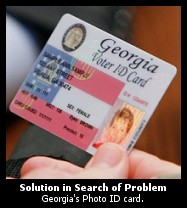 In recent years, such Photo ID laws have been pushed by Republicans in many states, as well as at the federal level, as solutions to the virtually non-existent problem of "voter fraud," (not to be confused with the very real concerns of election fraud). Several states, including Georgia, have found such laws, time and again, to be unconstitutional "modern day poll taxes."
In recent years, such Photo ID laws have been pushed by Republicans in many states, as well as at the federal level, as solutions to the virtually non-existent problem of "voter fraud," (not to be confused with the very real concerns of election fraud). Several states, including Georgia, have found such laws, time and again, to be unconstitutional "modern day poll taxes."
In Georgia, the combination of the new photo ID restrictions and non-transparent, unverifiable electronic voting systems used --- on which it is physically and scientifically impossible to assure that even a single vote is counted as cast --- guarantees only one thing: that Georgia voters have absolutely no basis for confidence in the election results.
Other reports of problems in Georgia today include:
- A precinct in the suburban city of Covington, Ga., opened only to discover the wrong keys — needed to turn them on — had been delivered with its new electronic voting machines, according to The Daily Report Online.
And from the 11Alive article:
- At a polling place in Covington, the first voters who showed up at Prospect United Methodist Church said poll workers had forgotten the keys to the ballot box.
- Voters at MLK Towers had to stand in line for hours to vote on a paper ballot, one person at a time. That problem has since been fixed, the Secretary of State's Office reported.
- In Henry County, a voter said poll workers at Locust Grove Elementary had the wrong computers and people were leaving without voting.
- At Murphy Candler Elementary, dozens of voters showed up to find out they had been reassigned to a new precinct. The elections office said those voters had been sent notices of the change, but several voters said they did not receive them.
From the Election Protection News Advisory:
- Cliftondale School (Butner Road, in unincorporated Fulton, 30349) - 100's of people lined up; only 1 machine working; many people left polling place. [listed with this update: "RESOLVED. Lines have shortened."]
- Murphey Candler Elementary, 6775 S. Goddard Rd. Lithonia, GA - 50 voters turned away from polls. Being told to go to Flat Rock Elementary. (3-5 miles away) Sam Tillman of DeKalb Co. Elections said voters were mailed letters in June 2007, that precinct would change to address overcrowding issues. In July, they sent updated voter registration cards. All but one of the voters said they were not notified of the change.
UPDATE 10:40pm PT: The following video from the "Welcome All Community" center comes courtesy of VideoThevote and videographer John Fortuin, who report that voters at this precinct "waited two hours and longer, and many had to return to work prior to voting."
UPDATE 2/6/08 5:15pm PT: Wired has several audio MP3s of phone calls from Georgia to voter complaint hotlines, documenting the problems and long wait times at various polling places in the state.


 Kamala Rising:
Kamala Rising: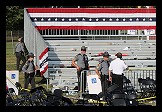 Evidence Fails to Establish Attempted Trump Assass-ination Politically Motivated
Evidence Fails to Establish Attempted Trump Assass-ination Politically Motivated Former MAGA 'Cultist' on the State of the Race for 'MAGA Americans': 'BradCast' 7/23/24
Former MAGA 'Cultist' on the State of the Race for 'MAGA Americans': 'BradCast' 7/23/24  'Green News Report' 7/23/24
'Green News Report' 7/23/24
 Biden Out, Endorses
Biden Out, Endorses BIDEN DROPS REELECTION BID
BIDEN DROPS REELECTION BID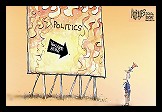 Sunday 'You Are Here' Toons
Sunday 'You Are Here' Toons What J.D. Vance Forgot to Tell You (and Lied About) at the RNC: 'BradCast' 7/18/24
What J.D. Vance Forgot to Tell You (and Lied About) at the RNC: 'BradCast' 7/18/24 'Green News Report' 7/18/24
'Green News Report' 7/18/24 Holding on for Dear Life Amid the Political Whirlwind: 'BradCast' 7/17/24
Holding on for Dear Life Amid the Political Whirlwind: 'BradCast' 7/17/24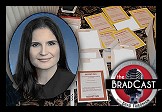 Cannon's Corruption: 'BradCast' 7/16/24
Cannon's Corruption: 'BradCast' 7/16/24 'Green News Report' 7/16/24
'Green News Report' 7/16/24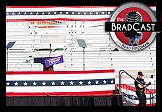 Amid the Assassination Attempt Aftermath:
Amid the Assassination Attempt Aftermath:
 Meanwhile... : 'BradCast' 7/11/24
Meanwhile... : 'BradCast' 7/11/24 'Green News Report' 7/11/24
'Green News Report' 7/11/24 Paging 'Johnny Unbeatable'! Dems (Actually!) in Disarray!: 'BradCast' 7/10/24
Paging 'Johnny Unbeatable'! Dems (Actually!) in Disarray!: 'BradCast' 7/10/24 SCOTUS Immunity Ruling 'As Bad as it Sounds', And Worse: 'BradCast' 7/9/24
SCOTUS Immunity Ruling 'As Bad as it Sounds', And Worse: 'BradCast' 7/9/24 So, What Now?: 'BradCast' 7/8/24
So, What Now?: 'BradCast' 7/8/24 Debunking MAGA Cult Xenophobia
Debunking MAGA Cult Xenophobia A Friendly Suggestion: Harris-Newsom 2024
A Friendly Suggestion: Harris-Newsom 2024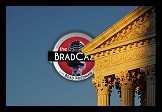 Prosecutor: SCOTUS Corruption Ruling Less Corrupt Than Appears: 'BradCast' 6/27/24
Prosecutor: SCOTUS Corruption Ruling Less Corrupt Than Appears: 'BradCast' 6/27/24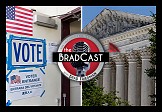 Good News and Bad: At the Polls and From the Corrupted Court: 'BradCast' 6/26/24
Good News and Bad: At the Polls and From the Corrupted Court: 'BradCast' 6/26/24 'Emptywheel' on Assange Hacking, Plea Deal: 'BradCast' 6/25/24
'Emptywheel' on Assange Hacking, Plea Deal: 'BradCast' 6/25/24
 VA GOP VOTER REG FRAUDSTER OFF HOOK
VA GOP VOTER REG FRAUDSTER OFF HOOK Criminal GOP Voter Registration Fraud Probe Expanding in VA
Criminal GOP Voter Registration Fraud Probe Expanding in VA DOJ PROBE SOUGHT AFTER VA ARREST
DOJ PROBE SOUGHT AFTER VA ARREST Arrest in VA: GOP Voter Reg Scandal Widens
Arrest in VA: GOP Voter Reg Scandal Widens ALL TOGETHER: ROVE, SPROUL, KOCHS, RNC
ALL TOGETHER: ROVE, SPROUL, KOCHS, RNC LATimes: RNC's 'Fired' Sproul Working for Repubs in 'as Many as 30 States'
LATimes: RNC's 'Fired' Sproul Working for Repubs in 'as Many as 30 States' 'Fired' Sproul Group 'Cloned', Still Working for Republicans in At Least 10 States
'Fired' Sproul Group 'Cloned', Still Working for Republicans in At Least 10 States FINALLY: FOX ON GOP REG FRAUD SCANDAL
FINALLY: FOX ON GOP REG FRAUD SCANDAL COLORADO FOLLOWS FLORIDA WITH GOP CRIMINAL INVESTIGATION
COLORADO FOLLOWS FLORIDA WITH GOP CRIMINAL INVESTIGATION CRIMINAL PROBE LAUNCHED INTO GOP VOTER REGISTRATION FRAUD SCANDAL IN FL
CRIMINAL PROBE LAUNCHED INTO GOP VOTER REGISTRATION FRAUD SCANDAL IN FL Brad Breaks PA Photo ID & GOP Registration Fraud Scandal News on Hartmann TV
Brad Breaks PA Photo ID & GOP Registration Fraud Scandal News on Hartmann TV  CAUGHT ON TAPE: COORDINATED NATIONWIDE GOP VOTER REG SCAM
CAUGHT ON TAPE: COORDINATED NATIONWIDE GOP VOTER REG SCAM CRIMINAL ELECTION FRAUD COMPLAINT FILED AGAINST GOP 'FRAUD' FIRM
CRIMINAL ELECTION FRAUD COMPLAINT FILED AGAINST GOP 'FRAUD' FIRM RICK SCOTT GETS ROLLED IN GOP REGISTRATION FRAUD SCANDAL
RICK SCOTT GETS ROLLED IN GOP REGISTRATION FRAUD SCANDAL VIDEO: Brad Breaks GOP Reg Fraud Scandal on Hartmann TV
VIDEO: Brad Breaks GOP Reg Fraud Scandal on Hartmann TV RNC FIRES NATIONAL VOTER REGISTRATION FIRM FOR FRAUD
RNC FIRES NATIONAL VOTER REGISTRATION FIRM FOR FRAUD EXCLUSIVE: Intvw w/ FL Official Who First Discovered GOP Reg Fraud
EXCLUSIVE: Intvw w/ FL Official Who First Discovered GOP Reg Fraud GOP REGISTRATION FRAUD FOUND IN FL
GOP REGISTRATION FRAUD FOUND IN FL


































